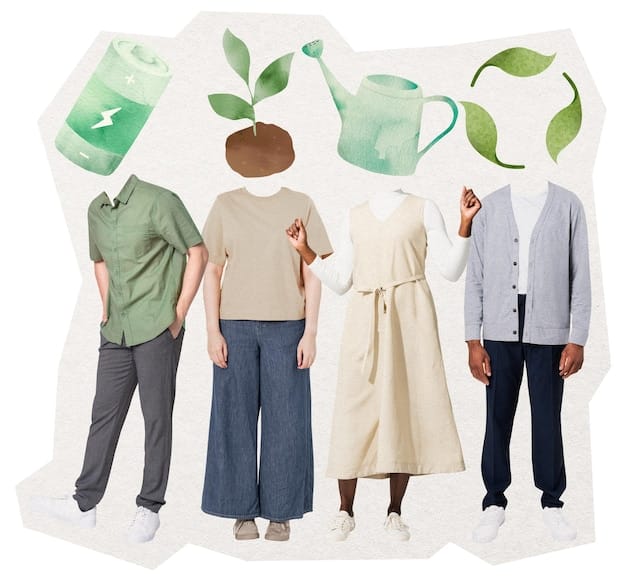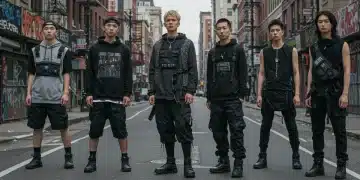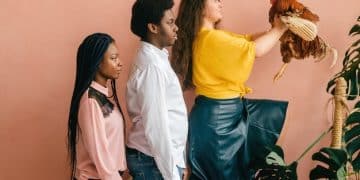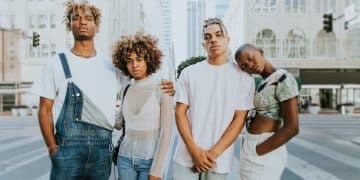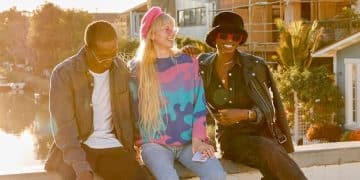Sustainable Underground: 5 Eco-Friendly Brands Revolutionizing Alternative Fashion in US
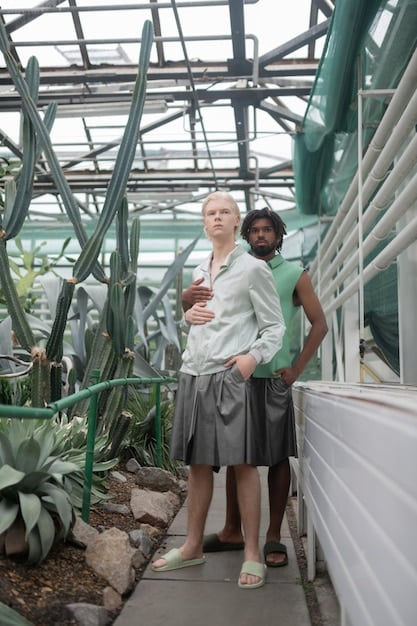
Sustainable fashion has found a revolutionary home within the underground scene in the US, where five pioneering eco-friendly brands are redefining alternative aesthetics with ethical production, innovative materials, and a commitment to environmental stewardship, proving that style and sustainability can coexist.
The fashion world is often seen as a paradox: a realm of self-expression and artistry, yet also one of significant environmental impact. However, a quiet revolution is bubbling up from below the surface, proving that style doesn’t have to come at the Earth’s expense. This shift is particularly evident in the alternative fashion scene, where creativity thrives outside mainstream norms. We delve into how Sustainable Underground: 5 Eco-Friendly Brands Revolutionizing Alternative Fashion in US are spearheading this vital movement, intertwining ethics, aesthetics, and innovation.
The Rise of Sustainable Underground Fashion
Once considered a niche within a niche, sustainable alternative fashion is gaining momentum, challenging the fast-fashion paradigm. This movement is not just about eco-friendly materials; it encompasses ethical labor practices, waste reduction, and a commitment to longevity in design.
The underground fashion scene has always been a crucible for experimentation and counter-culture expression. Now, it’s channeling that rebellious spirit into a fight for environmental justice and conscious consumption. Brands operating in this space are often small-batch, artisanal, and deeply connected to their values, offering a stark contrast to the mass-produced uniformity of conventional retail.
Understanding the “Underground” Aesthetic and Its Eco-Conscious Evolution
The term “underground” in fashion typically refers to styles that emerge from subcultures, defying mainstream trends and often emphasizing DIY, repurposed, or unconventional elements. This inherent transgressive nature makes it a fertile ground for sustainability. The very act of rejecting mass production aligns organically with eco-friendly principles.
- Rejection of Fast Fashion: Underground brands inherently oppose the disposable nature of fast fashion, favoring durability and timelessness.
- Emphasis on Individuality: Sustainable practices often lead to unique, limited-run pieces, appealing to those who value individuality.
- Community-Driven Ethos: Many underground labels are built on strong community values, which can extend to fair labor and local sourcing.
This evolution means that the distinctive looks—from gothic and punk to bohemian and street style—are now being infused with a new layer of meaning: responsibility. It’s about looking good while doing good, ensuring that self-expression doesn’t come at the cost of planetary well-being. The growth of this sector signifies a profound shift in consumer values within the alternative community, prioritizing transparency and ethical supply chains.
The embrace of sustainable practices within alternative fashion is also a response to growing awareness about the fashion industry’s impact. Consumers are more informed about issues like textile waste, water pollution from dyeing processes, and unethical labor conditions. These discussions have spurred brands to innovate, pushing the boundaries of what’s possible in ethical production.
Furthermore, the creative freedom inherent in underground fashion allows for more radical experimentation with sustainable materials and production methods. Unlike large corporations beholden to shareholder demands or strict cost efficiencies, smaller, independent brands can take risks, invest in novel solutions, and prioritize impact over profit margins. This agile approach enables them to lead by example, showcasing how sustainable fashion can be both cutting-edge and commercially viable.
Brand 1: Reclaimed Threads – Stitching a Subculture of Sustainability
Reclaimed Threads exemplifies the DIY, upcycled spirit at the heart of sustainable underground fashion. Based in Portland, Oregon, this brand specializes in transforming vintage garments and deadstock fabrics into entirely new, often one-of-a-kind pieces that resonate with punk, grunge, and bohemian aesthetics.
Their design philosophy centers on creative repurposing, giving renewed life to materials that would otherwise end up in landfills. This approach not only reduces waste but also results in unique garments with a story. Each piece carries the history of its original fabric, reimagined for a contemporary, conscious consumer.
Signature Techniques and Ethical Sourcing
Reclaimed Threads employs techniques like deconstruction, patchwork, and hand-dyeing using natural pigments. Their strength lies in their ability to see potential in discarded textiles, turning them into wearable art. Sourcing is meticulous, often involving partnerships with local thrift stores and textile recyclers.
- Upcycling Expertise: Mastery in transforming old into new, preventing textile waste.
- Local Collaborations: Working with local suppliers reduces transportation emissions and supports regional economies.
- Artisanal Craftsmanship: Each item is hand-finished, ensuring quality and individual character.
The brand’s commitment extends to its labor practices, ensuring fair wages and safe working conditions for all crafters involved in the production process. Reclaimed Threads proves that fashion can be both deeply creative and profoundly responsible, challenging conventional notions of production and consumption. Their commitment to sustainability is woven into every aspect of their operation, from material acquisition to the final product, offering a compelling model for others in the industry.
This brand appeals to a demographic actively seeking alternatives to mass-produced fashion, valuing authenticity and environmental responsibility. Reclaimed Threads embodies the ethos that true style comes from intentional choices and a deeper connection to the garments we wear. Their success demonstrates that there is a viable market for slow fashion within the underground community, driven by a desire for unique aesthetics and ethical transparency.
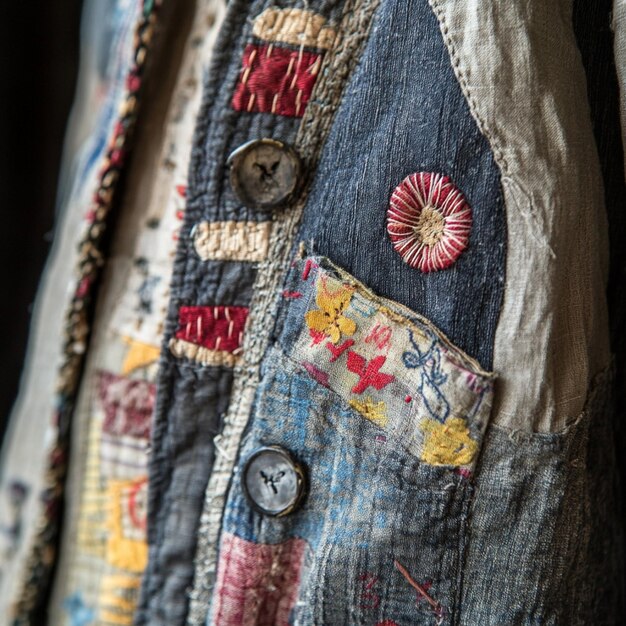
Brand 2: Eco-Goth Collective – Darkness with a Green Conscience
The Eco-Goth Collective, based out of Philadelphia, merges the dark, romantic aesthetic of gothic fashion with an unwavering commitment to environmental sustainability. They challenge the misconception that alternative styles cannot be eco-friendly, proving that depth and conscience can coexist beautifully.
Their collections feature clothing and accessories crafted from organic cotton, hemp, and innovative recycled materials like PET plastics. The brand ensures their dyeing processes are low-impact, often using natural dyes or closed-loop systems to minimize water pollution.
Key Sustainable Practices and Community Engagement
Eco-Goth Collective focuses on durable, timeless pieces designed to last, thus combating the disposable nature of fast fashion. They emphasize ethical labor, producing mainly in small, local workshops or through fair-trade partnerships.
- Organic & Recycled Materials: Prioritizing textiles with a low environmental footprint.
- Longevity in Design: Creating clothing meant to endure in both style and quality.
- Transparent Supply Chains: Openly sharing information about their material sourcing and production.
Beyond their products, Eco-Goth Collective actively engages with their community, advocating for sustainable practices and raising awareness about environmental issues within the gothic subculture. They often host workshops on mending and upcycling, fostering a culture of conscious consumption among their clientele. This holistic approach makes them a leader in sustainable alternative fashion, demonstrating that conscious choices can extend to every facet of life, including one’s wardrobe.
Their designs often integrate elements of Victorian, romantic, and modern gothic aesthetics, but with a palpable sense of ethical responsibility. By catering to a specific subculture with deep roots in individuality and artistic expression, Eco-Goth Collective shows that niche markets can be powerful drivers of sustainable change. Their brand illustrates how aesthetic preference does not need to compromise environmental values, making sustainable fashion accessible and appealing to a broader range of styles.
The brand’s success highlights the growing demand for ethically produced garments within subcultures previously overlooked by mainstream sustainable fashion. It’s an affirmation that sustainability is not a monolithic concept but adaptable to diverse aesthetic expressions, offering distinct choices for consumers who want to align their wardrobe with their values. This approach strengthens the foundation of a more diverse and inclusive sustainable fashion movement.
Brand 3: Urban Alchemy – Sustainable Streetwear for the Conscious Rebel
Urban Alchemy, originating from Los Angeles, is at the forefront of sustainable streetwear, blending urban cool with an undeniable commitment to eco-conscious practices. Their aesthetic leans into oversized silhouettes, graphic prints, and utilitarian details, all produced with sustainability at its core.
The brand primarily utilizes deadstock fabrics, organic cotton, and recycled polyester. They are also experimenting with innovative materials like upcycled denim composites and pineapple leather for accessories, highlighting their dedication to pushing material boundaries in their collections.
Materials, Production, and Design Philosophy
Urban Alchemy’s production methods prioritize resource efficiency and waste reduction. They often employ water-saving dyeing techniques and minimize textile waste through clever pattern cutting and repurposing scraps into accessories or new fabric blends.
- Innovative Material Use: Continuously exploring new eco-friendly fabrics and upcycling methods.
- Ethical Manufacturing: Partnering with local, fair-wage factories in California.
- Versatile, Durable Designs: Creating pieces that can be layered and worn in multiple ways, promoting long-term use.
Their designs are inherently versatile and built to last, urging consumers to invest in quality over quantity. Urban Alchemy actively promotes a “buy less, choose well” philosophy, a cornerstone of sustainable consumption. They aim to educate their customer base on the impact of their clothing choices, fostering a community of conscious rebels who value both style and environmental integrity. This brand’s commitment to sustainable urban fashion offers a compelling vision for the future of streetwear, proving that conscious consumption can be as edgy as it is ethical.
Urban Alchemy’s appeal lies in its ability to marry contemporary streetwear aesthetics with tangible sustainable actions, making ethical fashion desirable for a younger, trend-conscious audience. They demonstrate that sustainable practices do not have to compromise on style or relevance, but rather can enhance a brand’s credibility and appeal. Their success underscores the increasing market demand for streetwear that aligns with environmental and social values, setting a new benchmark for the sector.
By focusing on limited drops and emphasizing the longevity of their garments, Urban Alchemy further differentiates itself from the often-ephemeral nature of mainstream streetwear. This approach encourages mindful consumption, promoting a deeper appreciation for the craftsmanship and ethical journey of each piece. Their brand is a testament to the power of design in fostering sustainable habits among consumers.
Brand 4: Mystical Earth Apparel – Eco-Bohemian for the Soul
Mystical Earth Apparel, based in Sedona, Arizona, offers a unique blend of bohemian, spiritual, and witchy aesthetics, all rooted in strong sustainable practices. Their clothing is designed to connect wearers to nature, reflecting a harmonious relationship between humanity and the environment.
The brand’s materials include organic cotton, hemp, Tencel, and peace silk, all chosen for their minimal environmental impact and luxurious feel. They often incorporate natural dyes derived from plants and minerals, resulting in earthy color palettes and unique patterns.
Ethical Production and Spiritual Alignment
Mystical Earth Apparel prioritizes ethical production, working with small artisan collectives and fair-trade cooperatives in both the US and abroad. Their focus is on preserving traditional crafting techniques while ensuring fair wages and safe working conditions.
- Natural & Sustainable Fibers: Utilizing materials that are gentle on the planet and soft on the skin.
- Artisan Partnerships: Supporting traditional craft and ensuring fair labor practices.
- Eco-Friendly Dyeing: Employing natural dyes and water-saving methods for vibrant, non-toxic colors.
Their designs often feature flowy silhouettes, intricate embroidery, and spiritual symbols, appealing to a customer base that values connection to nature and self-expression through ethically made clothing. Mystical Earth Apparel encourages a slower approach to fashion, where each piece is cherished and worn for its quality, comfort, and conscious origin. Their brand proves that ethical fashion can be beautiful, comfortable, and deeply aligned with one’s personal values, offering a unique sustainable option for the free-spirited individual.
The brand’s ethos resonates deeply with individuals who prioritize spiritual wellness, environmental consciousness, and a connection to the natural world. Mystical Earth Apparel demonstrates that sustainability can be elegantly woven into a specific lifestyle and aesthetic, proving its versatility across diverse consumer preferences. Their commitment to ethical sourcing and production extends to the entire lifecycle of their garments, ensuring a positive impact from fiber to finished product.
By offering pieces that are not only sustainable but also imbued with a sense of purpose and connection, Mystical Earth Apparel cultivates a loyal following. Their approach shows that fashion can indeed be a vehicle for promoting holistic well-being and environmental stewardship, transcending mere aesthetics to become a statement of conscious living. This brand’s success highlights the growing synergy between personal values and consumer choices in the modern marketplace.
Brand 5: Pixelated Threads – Future-Forward and Fully Recycled
Pixelated Threads, based in Brooklyn, New York, represents the cutting edge of sustainable alternative fashion, focusing on digital aesthetics and circularity. This brand specializes in creating garments from 100% recycled materials, often incorporating bold, graphic prints that mimic digital glitches and pixelated art.
Their primary materials include recycled polyester from plastic bottles, upcycled industrial textile waste, and regenerated nylon. They are also pioneers in utilizing advanced textile recycling technologies to break down pre- and post-consumer waste into new fibers, minimizing landfill contribution.
Circular Economy and Digital Integration
Pixelated Threads operates on a circular economy model, aiming for zero waste in their production cycle. They offer take-back programs for their old garments, which are then processed and transformed into new collections, closing the loop on textile waste.
- 100% Recycled Content: Committing to using only repurposed and regenerated materials.
- Circular Design Principles: Designing products with their end-of-life and subsequent rebirth in mind.
- Tech-Driven Sustainability: Utilizing innovative technologies for material recycling and digital design.
Their aesthetic is distinctively futuristic, appealing to those who embrace a modern, tech-savvy style while prioritizing environmental responsibility. Pixelated Threads proves that high-tech and high-fashion can be environmentally sound, ushering in a new era of sustainable garment production. By integrating digital design tools and focusing on innovative recycling processes, this brand is charting a course for the future of sustainable alternative fashion, marrying cutting-edge aesthetics with a deeply responsible approach to consumption and waste management.
The brand’s emphasis on a circular economy model makes it a standout in the sustainable fashion landscape, offering a tangible solution to textile waste. Pixelated Threads illustrates that radical innovation in materials and production can drive both environmental benefits and unique aesthetic outcomes. Their success suggests a growing consumer interest in brands that offer a clear path toward a more sustainable and technologically advanced future for fashion.
Furthermore, their digital-first approach in design and marketing resonates strongly with a generation accustomed to virtual realities and digital expressions. This synergy allows Pixelated Threads to connect with their audience on multiple levels, fostering a community that values both environmental stewardship and forward-thinking aesthetics. They are not just selling clothes; they are selling a vision for a more sustainable, tech-integrated fashion future.
The Impact and Future of Sustainable Underground Fashion in the US
The collective efforts of brands like Reclaimed Threads, Eco-Goth Collective, Urban Alchemy, Mystical Earth Apparel, and Pixelated Threads are shaping the future of fashion. Their work extends beyond creating eco-friendly clothing; they are fostering a new mindset among consumers and inspiring broader industry change. These brands demonstrate that sustainability is not a compromise but an opportunity for innovation, creativity, and deeper connection with one’s values.
The impact of the sustainable underground movement is multifaceted. Firstly, it offers tangible, ethical alternatives to conventionally produced clothing, giving consumers real choices. Secondly, it pushes the boundaries of acceptable materials and production methods, challenging the status quo. Lastly, it proves that sustainability can be a powerful aesthetic and a core component of brand identity.
Challenges and Opportunities
Despite their growth, sustainable underground brands face challenges, primarily around scaling production, educating consumers, and competing with the price points of fast fashion. However, these challenges also present opportunities for further innovation and collaboration.
- Consumer Education: Raising awareness about the true cost of unsustainable fashion and the value of ethical alternatives.
- Supply Chain Development: Building out robust, sustainable supply chains for niche materials and small-batch production.
- Technological Advancement: Investing in and adopting new eco-friendly textile and manufacturing technologies.
The future of sustainable underground fashion looks promising. As consumer awareness grows and demand for ethical products increases, these pioneering brands are well-positioned to lead the way. Their authenticity and commitment to their values resonate deeply with a generation of conscious consumers who seek more than just clothing; they seek purpose and positive impact in their purchases. The growth of this sector signals a powerful message to the mainstream fashion industry: sustainability is no longer a niche concern but a fundamental expectation. The innovative spirit of underground fashion, combined with a strong ethical compass, has created a vibrant and vital segment of the fashion market that continues to evolve and inspire.
The collaborative spirit often found within the underground scene also plays a crucial role. Many of these brands share resources, knowledge, and even sometimes materials, fostering an ecosystem of mutual support rather than cut-throat competition. This collaborative approach enhances their collective impact, allowing them to overcome individual obstacles and magnify their presence in the market. This unique synergy highlights how shared values can drive collective success and accelerate the adoption of sustainable practices across the fashion landscape.
Moreover, the emphasis on storytelling – the narrative behind each piece, its materials, and its makers – deepens the consumer’s connection to the product. This narrative value contrasts sharply with the anonymous production of fast fashion, offering a more meaningful and enduring relationship with clothing. As this movement gains further traction, it will continue to reshape consumer expectations and push the entire industry toward more responsible practices, proving that the underground holds the seeds of fashion’s most important future innovations.
| Key Aspect | Brief Description |
|---|---|
| 🌿 Material Innovation | Brands use organic, recycled, and upcycled fabrics to reduce environmental impact significantly. |
| 🛠️ Ethical Production | Focus on fair wages, safe conditions, and local/artisan partnerships in manufacturing. |
| 🔄 Circular Economy | Embracing designs for longevity, repairability, and end-of-life recycling programs. |
| 🎨 Unique Aesthetics | Merging alternative fashion styles (goth, punk, streetwear) with eco-conscious principles. |
Frequently Asked Questions About Sustainable Underground Fashion
▼
In underground fashion, “sustainable” encompasses the use of eco-friendly materials like organic cotton or recycled fabrics, ethical production practices that ensure fair labor, and a commitment to longevity and circularity in design. It’s about minimizing environmental impact and promoting social responsibility throughout the garment’s lifecycle, often with a unique, non-mainstream aesthetic.
▼
The alternative fashion scene, historically rebellious and DIY-oriented, naturally aligns with sustainability. Its rejection of mass production and emphasis on individuality and craftsmanship make it fertile ground for eco-conscious practices. Subcultures often value authenticity and ethical sourcing, seeing sustainability as an extension of their core values, offering a compelling counter-narrative to fast fashion.
▼
Sustainable underground brands ensure ethical production through transparent supply chains, often partnering with local artisans or fair-trade certified workshops. They prioritize fair wages, safe working conditions, and sometimes engage in small-batch production to maintain oversight. Many avoid outsourcing to regions with poor labor records, preferring to keep production closer to home or with trusted partners.
▼
While often priced higher than fast fashion due to ethical labor and quality materials, sustainable alternative fashion can be considered affordable in the long run. These garments are designed for durability and timelessness, reducing the need for frequent replacements. Investing in fewer, higher-quality, ethically made pieces aligns with conscious consumption, offering better value over time.
▼
Upcycling is a cornerstone of sustainable underground fashion, transforming discarded materials (vintage clothes, deadstock) into new garments. It significantly reduces textile waste and conserves resources. This practice also aligns with the DIY and unique aesthetic often found in alternative fashion, creating one-of-a-kind pieces with minimal environmental impact, fostering creativity and circularity.
Conclusion
The emergence of sustainable underground fashion in the US marks a pivotal moment, demonstrating that style, innovation, and environmental responsibility can merge seamlessly. Brands like Reclaimed Threads, Eco-Goth Collective, Urban Alchemy, Mystical Earth Apparel, and Pixelated Threads are not merely selling clothes; they are selling a vision for a more conscious and creative future. By championing ethical practices, innovative materials, and unique aesthetics, they are revolutionizing the alternative fashion landscape, offering compelling options for consumers who seek to express themselves while making a positive impact on the planet. Their collective work paves the way for a fashion industry that is as sustainable as it is stylish, proving that true rebellion lies in making responsible choices.
